Discover DiEM25
DiEM25

79 Episodes
Reverse
Ten years after Greece’s thunderous “NO” to austerity, Yanis Varoufakis sits down with film-maker Raoul Martinez and host Mehran Khalili to revisit that historic showdown with Europe’s political establishment. We bust the official myths, look at lessons learned, and spell out what activists across Europe must do next. If you missed the story: Greece elected the anti-austerity Syriza party in early 2015, with Yanis Varoufakis as finance minister. After months of bruising talks with the European Central Bank, IMF and European Commission, the government put the creditors’ terms to a 5 July referendum. Sixty two percent voted NO — but days later, Athens agreed to a third “bailout”, Yanis resigned, and Greece was locked into another cycle of cuts that to this day, it still hasn’t escaped. *** SPECIAL OFFER: Use code Storm25 to get 20% off the documentary we discuss in this video, In the Eye of the Storm! https://vimeo.com/ondemand/eyeofthestormenglish *** In this talk, we unpack the new six-part series In the Eye of the Storm – from secret Eurogroup recordings to the street-level activist energy in Athens – and draw fresh lessons on leverage, media war, plan B economics and movement discipline. Whether you marched in 2015 or are gearing up for the next fight, this conversation will arm you with the story behind the headlines and the tactics to win round two. SUPPORT US Join: https://diem25.org/join Donate: https://diem25.org/donate Subscribe: https://www.youtube.com/c/DiEM25official
Israel’s genocide in Gaza grinds on, while Israeli officials now signal they are “fully ready” to strike Iran—raising the risk of a regional firestorm. But within the EU, dissent is being crushed. In an unprecedented case, the EU has sanctioned one of its own citizens for being a journalist. http://red.media founder Hüseyin Doğru was targeted on behalf of Germany—for exposing Germany’s complicity in the genocide in Palestine. No trial. No hearing. An extrajudicial punishment. The EU claims he “systematically spread false information on politically controversial subjects with the intent of creating ethnic, political and religious discord amongst a predominantly German audience.” In reality, his reporting focused on social protests across Germany and Europe—something that now appears to go too far for the so-called democratic powers in Berlin and Brussels. The listing followed http://red.media’s exclusive coverage of Germany’s brutal crackdown on pro-Palestinian students—and it forced the outlet to shut down. What does it mean when reporting on Gaza is reframed as extremism, and journalism itself becomes a sanctionable offense? Hüseyin Doğru joins Yanis Varoufakis to dissect Europe’s widening assault on free speech, Germany’s criminalisation of Palestine solidarity, and how ordinary citizens can push back—before they too are silenced. Hosted by Mehran Khalili. Tune in live, bring your questions, and share widely—while you still can. SUPPORT US Join: https://diem25.org/join Donate: https://diem25.org/donate Subscribe: https://www.youtube.com/c/DiEM25official
Israel is escalating its genocide in Gaza. Entire families are being wiped out, famine is spreading, and airstrikes are targeting shelters and schools. In the West Bank, killings and settler violence are surging as Israel tightens its grip on the territory. Yet despite these atrocities, international media coverage has diminished. While a handful of European governments have begun to question their complicity, meaningful action is still missing. In this livestream, Palestinian writer and organiser Mohammed El-Kurd joins Yanis Varoufakis to cut through the noise: What’s really happening on the ground? Why has the West been so slow, or unwilling, to act? And what can we, as citizens, do about it? Hosted by Mehran Khalili. SUPPORT US Join: https://diem25.org/join Donate: https://diem25.org/donate Subscribe: https://www.youtube.com/c/DiEM25official
Jeffrey Sachs and Yanis Varoufakis worked together a decade ago to prevent Europe from harming itself by crushing Greece. They failed. Since then, Europe’s self-harming policies exacerbated by a lethal dependence on, and servility to, the US have had nasty repercussions for Ukraine, Palestine as well as Europe’s relations with China. Now that Trump is back, with Europe’s Green Deal already abandoned, the world is facing the perfect storm: intense trade (and thus class) wars, a mounting Cold War with China, an ultra-hot war in Ukraine, a heart-wrenching genocide in Palestine, and an accelerating climate emergency. In this episode, Jeffrey Sachs and Yanis Varoufakis get back together again to reminisce, to take stock of a world spinning out of control and, crucially, to propose tangible solutions that we must campaign for today. SUPPORT US Join: https://diem25.org/join Donate: https://diem25.org/donate Subscribe: https://www.youtube.com/c/DiEM25official
Marine Le Pen, leader of France’s far right and a top contender for the presidency, has just been banned from running after a corruption conviction. Is this a legitimate ruling — or lawfare: the weaponisation of the legal system to block political opponents? Join Yanis Varoufakis, award-winning journalist Glenn Greenwald, and Jacobin’s Europe editor David Broder for a live discussion hosted by Mehran Khalili. We’ll break down the Le Pen ruling, look at how courts are used to sideline opposition figures in Europe and beyond, and ask: Does barring candidates actually strengthen the far right? Is lawfare becoming the establishment’s go-to tool to silence dissent? And if we don’t challenge it now, what comes next? SUPPORT US Join: https://diem25.org/join Donate: https://diem25.org/donate Subscribe: https://www.youtube.com/c/DiEM25official
Yanis Varoufakis recently called Europe’s rearmament a catastrophe in the making — and laid out a bold peace plan for Ukraine. Now, he’s taking your questions head-on: about Ukraine, the EU’s failed war strategy, and what a real path to peace and sovereignty could look like. Whether you agree or not, this is the debate Europe refuses to have. Hosted by Mehran Khalili. SUPPORT US Join: https://diem25.org/join Donate: https://diem25.org/donate Subscribe: https://www.youtube.com/c/DiEM25official
Welcome to Counter Stream—DiEM25’s unfiltered monthly dive into the stories shaping our world that mainstream media ignores or distorts. In this powerful new episode, Julijana Zita is joined by Kinza Saleem for a wide-ranging conversation that connects the dots between Trump’s authoritarian circus, global resource grabs, and the crumbling illusions of European identity. From Trump’s self-coronation and war on democracy to the brutal deportations and executive orders that target the most vulnerable, we examine how psychological warfare and spectacle are being used to desensitise and divide. We look at the US-Russia deal-making over Ukraine exposing the new phase of imperialism: economic colonisation wrapped in “reconstruction.” Meanwhile, Congo burns in silence. China rises with vision and strategy. Europe cries at its own irrelevance. And the far right surges—while the left, once again, stands to pick up the pieces. This is not business as usual. This is Counter Stream. SUPPORT US Join: https://diem25.org/join Donate: https://diem25.org/donate Subscribe: https://www.youtube.com/c/DiEM25official
DeepSeek has upended the AI industry with open-source models that rival OpenAI’s GPT-4, shaking the global tech and financial order. But its rise also raises urgent questions about security, economic power, and AI’s future. In this live discussion, Yanis Varoufakis and Malaysia-based entrepreneur and commentator Arnaud Bertrand will explore the fallout, hosted by Mehran Khalili. How does DeepSeek’s model challenge monopolistic “cloud capital” like Amazon’s Alexa? Does it prove that cutting-edge AI no longer requires vast computational resources? And with its data stored on Chinese servers, is AI becoming the new frontline in U.S.-China tensions? Beyond the tech, this is a battle over power—financial, political, and military. What happens next? Join us live, be part of the conversation, and send in your questions! FOLLOW THE SPEAKERS Mehran: https://x.com/mkhalili Yanis: https://x.com/yanisvaroufakis Arnaud: https://x.com/RnaudBertrand SUPPORT US Join: https://diem25.org/join Donate: https://diem25.org/donate Subscribe: https://www.youtube.com/c/DiEM25official
As Donald Trump assumes the presidency, the world is bracing for shifts in international relations and policy. From Israel’s genocide in Gaza to the war in Ukraine, the US’ strategic rivalry with China, and the challenges facing Europe, Trump’s administration is poised to leave a significant mark. What should we expect in the coming months on these critical issues? How might Trump’s foreign policy reshape Europe and its role in the world? Join Yanis Varoufakis and special guest Katie Halper—American journalist, political commentator, and host of The Katie Halper Show—for a live discussion hosted by Mehran Khalili. Join us and share your questions and comments in real-time! FOLLOW THE SPEAKERS Mehran: https://x.com/mkhalili Yanis: https://x.com/yanisvaroufakis Katie: https://x.com/kthalps SUPPORT US Join: https://diem25.org/join Donate: https://diem25.org/donate Subscribe: https://www.youtube.com/c/DiEM25official
Elon Musk’s growing role in politics represents a troubling evolution in how wealthy elites shape public discourse and policy. From his control of X (formerly Twitter) to his involvement in U.S. elections alongside Donald Trump, to his recent support for anti-migrant and nationalist parties in Europe (including the AfD and Tommy Robinson), Musk’s actions highlight the alarming intersection of tech and political power. How has the influence of billionaires evolved to dominate public discourse so openly? What does this growing consolidation of power mean for democracy? And how we can people push back against it? Join Yanis Varoufakis and special guest Cory Doctorow—science fiction author, activist, and journalist—for a live discussion hosted by Mehran Khalili. Be part of the conversation and share your questions in real time! FOLLOW THE SPEAKERS Mehran: https://x.com/mkhalili Yanis: https://x.com/yanisvaroufakis Cory Doctorow: https://x.com/doctorow SUPPORT US Join: https://diem25.org/join Donate: https://diem25.org/donate Subscribe: https://www.youtube.com/c/DiEM25official
What happens when you speak up for Gaza in Germany? Melanie Schweizer — lawyer, political candidate with MERA25 Germany, and Ministry of Labour adviser — joins Mehran Khalili to expose how BILD, Germany’s biggest tabloid, targeted her for speaking out against Israel’s genocide. In this riveting interview, she reveals the toll of standing up for Palestine, the media’s role in silencing dissent, and why she refuses to back down. FOLLOW THE SPEAKERS Mehran: https://x.com/mkhalili Melanie: https://x.com/Melaniebelizi SUPPORT US Join: https://diem25.org/join Donate: https://diem25.org/donate Subscribe: https://www.youtube.com/c/DiEM25official
2024 has been a year of upheaval and awakening, marked by climate disasters, rising inequality, and a geopolitical landscape in turmoil. From the ongoing war in Ukraine to the genocide in Palestine and widespread protests across Europe, it's been a tough year for many. Meanwhile, political paralysis and a sense that decisions about our future are being made behind closed doors have left citizens feeling powerless. In this live conversation, Yanis Varoufakis and Srećko Horvat, together with host Mehran Khalili, will reflect on the defining moments of 2024, and look ahead to 2025. And we'll be asking: How can we build a Europe that works for everyone, not just the powerful few? And how can we ensure that 2025 becomes a turning point for democracy, peace, and justice everywhere?
In this discussion, Tiare Gatti Mora interviews Craig Gent, writer, editor, and researcher, and a director at Novara Media. They dive into the urgent themes of Gent’s latest book, Cyberboss — examining the rise of algorithmic management, the growing insecurity of workers, and the shifting role of labour unions in the face of technological control. Together, they explore how digital systems are undermining worker autonomy and fueling dissatisfaction, while navigating the complex politics within unions today. This is a must-watch for anyone concerned with the future of work and the fight for labour rights in the digital age. SUPPORT US Join: https://diem25.org/join Donate: https://diem25.org/donate Subscribe: https://www.youtube.com/c/DiEM25official
America is going to the polls in a divisive election which will shape not only its only policies, but also global affairs. Kamala Harris aims to uphold the course of the current administration, while Donald Trump eyes a return that could bring isolationism and a tougher stance on alliances. European leaders are watching closely, as the outcome will shape NATO, trade, and transatlantic security. What are the implications of this election for Europe, the Middle East crisis, and beyond? How might Harris or Trump’s foreign policy reshape global events? And what could their campaigns reveal about America’s future—and the prospects for progressive causes worldwide? Join Yanis Varoufakis, Rania Khalek (Lebanese-American writer, political activist and journalist at Breakthrough News) and our host Mehran Khalili for this important discussion on the future of US politics. Tune in live and share your questions! FOLLOW THE SPEAKERS Mehran: https://x.com/mkhalili Yanis: https://x.com/yanisvaroufakis Rania Khalek: https://x.com/RaniaKhalek SUPPORT US Join: https://diem25.org/join Donate: https://diem25.org/donate Subscribe: https://www.youtube.com/c/DiEM25official
EU governments are outdoing each other in introducing tough anti-immigration measures, embracing policies that would have been unthinkable just a few years ago. Poland is pushing to suspend the right to asylum, Germany has reinstated border controls, and Italy has opened two centres to process asylum seekers outside its borders. Now, EU leaders are considering ramping up deportations, aiming to send desperate people back to their countries of origin. All these measures point in the same direction: a Fortress Europe. Meanwhile, parties pushing for stricter immigration controls are gaining power in several EU countries and making significant strides in elections. And many citizens in host countries, feeling neglected by their governments and suffering from stagnant economic conditions, are increasingly hostile to migrants, seeing them as a burden on public resources and a threat to job security. What’s really driving this new clampdown on migration? What does it mean for the future of Europe’s approach to migration and human rights? And in this current political climate, what should our response be? Join Yanis Varoufakis, Miguel Duarte, Amir Kiyaei, Federico Dolce and Marie-Olivia Badarne as discuss Europe's migration policies and what it means for Europe. Tune in live and share your questions! FOLLOW THE SPEAKERS Mehran: https://x.com/mkhalili Yanis: https://x.com/yanisvaroufakis Miguel: https://x.com/MiguelCSDuarte Amir: https://x.com/AmirKiyaei Federico: https://x.com/federico_dolce Marie-Olivia: https://www.instagram.com/mariebadarne SUPPORT US Join: https://diem25.org/join Donate: https://diem25.org/donate Subscribe: https://www.youtube.com/c/DiEM25official
As we mark the anniversary of the October 7 attacks, the Israeli government has brought the Middle East to the brink of war. Backed by the West, Israel’s genocide in Gaza continues, and the conflict has expanded to fronts like Lebanon. Israeli actions in Iran and Lebanon have escalated tensions, drawing in Tehran. The humanitarian toll is immense, with over 40,000 Palestinians killed and millions displaced. Yet, despite widespread protests, particularly in Europe, activism has not stopped the war or changed policy. Israel continues with the full support of the US, Germany, and other Western governments. How did we get here? What could a wider war mean for the region and beyond? How should we assess activist strategies moving forward? Join Yanis Varoufakis, Wieland Hoban (Jewish Voice for a Just Peace), Lucas Febraro (BDS), activist and academic Nour Hariri, and more as we discuss the conflict, activism, and the path ahead. Tune in live and share your questions! FOLLOW THE SPEAKERS Mehran: https://x.com/mkhalili Yanis: https://x.com/yanisvaroufakis Nour: https://x.com/nooralhariri1 Lucas: https://x.com/lucasfebraro David: https://x.com/davidrkadler Wieland: https://www.instagram.com/wielhoban/ SUPPORT US Join: https://diem25.org/join Donate: https://diem25.org/donate Subscribe: https://www.youtube.com/c/DiEM25official
In this discussion, Mehran Khalili and political scientist Konstantina Zoehrer dive into the recent far-right electoral success in Austria. They examine the key takeaways for the Left and explore what progressive movements must understand and adapt to in order to counter the rise of the far-right. Join us for a critical conversation on the challenges ahead and how the Left can regroup in the face of these troubling developments. SUPPORT US Join: https://diem25.org/join Donate: https://diem25.org/donate Subscribe: https://www.youtube.com/c/DiEM25official
Once seen as a pillar of stability in Europe, Germany is unravelling. Its economy is in decline, and the far-right AfD recently won a state election, marking a disturbing shift in the political landscape. The country has reintroduced border controls, violating a core EU principle. And its legacy parties continue to slide into authoritarianism, suppressing pro-Palestinian voices at home while supporting Israel’s genocide in Gaza. Meanwhile, a housing crisis and soaring rents are straining German citizens, even as the government spends billions to support the Ukraine war and its foreign policy agenda. How did Germany get here? What does it mean for Europe? And how do we push back? Our panel — as well as a few new members of the team — will be weighing in, taking your questions and more. Join us! FOLLOW THE SPEAKERS Mehran: https://x.com/mkhalili Johannes: https://x.com/JohannesFehr Carolina: https://www.fsv.uni-jena.de/30085/rehrmann-carolina Judith: https://x.com/GermanPolyglot Julijana: https://x.com/julijana_zita Nour: https://x.com/nooralhariri1 Karin: http://instagram.com/karin.de.rigo Erik: https://x.com/edmantweet SUPPORT US Join: https://diem25.org/join Donate: https://diem25.org/donate Subscribe: https://www.youtube.com/c/DiEM25official
In a quiet vote last Tuesday, EU lawmakers brought in new rules for public spending… which could have a profound effect on millions in Europe. The supposed goal of this overhaul was to make the rules clearer and more investment-friendly, with supporters calling them a necessary step towards economic stability. But critics say the change will force big budget cuts in many EU member states, meaning less money for vital social services and climate action. And, they fear, it will lead Europe back to the dark days of austerity in the 2010s…that decimated living standards for a generation. DiEM25 is running in the European Elections this June, with a very different idea of how EU economic policy should look. In this live discussion, join our own Yanis Varoufakis with our lead candidates and others, to unpack this vital topic…and have your say! SUPPORT US Join: https://diem25.org/join Donate: https://diem25.org/donate Subscribe: https://www.youtube.com/c/DiEM25official
The long repression of pro-Palestinian voices in Germany reached a peak last Friday. German police shut down the Palestine Congress, a vital event to unite activists around a ceasefire for Gaza. They detained participants, including Jewish activists; they deported a Palestinian speaker. And then they banned our own Yanis Varoufakis, not only from making political speeches in Germany, but also from doing so over Zoom (!). These authoritarian moves make it clear: Germany is intent on silencing anyone who speaks out against its complicity in Israel’s ongoing genocide in Gaza. So for our livestream this week, Yanis Varoufakis and colleagues who attended the Palestine Congress will be dissecting this brazen act of state repression against Palestinian solidarity. What lessons can we draw? How has the reaction been? And what could all this mean for the future of free speech and pro-Palestine activism in Germany, and around the world? SUPPORT US Join: https://diem25.org/join Donate: https://diem25.org/donate Subscribe: https://www.youtube.com/c/DiEM25official
 United States
United States

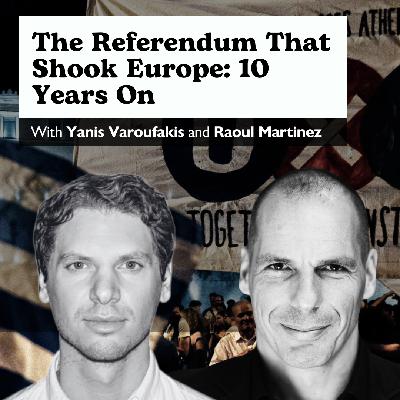
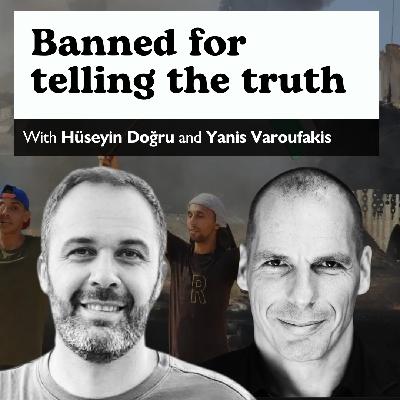
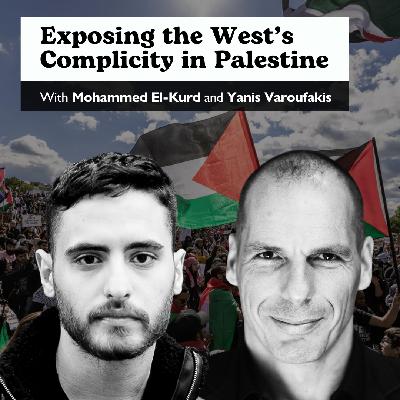
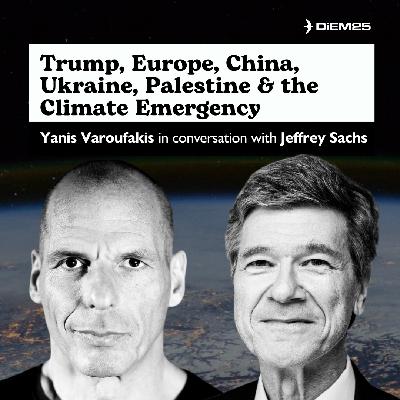
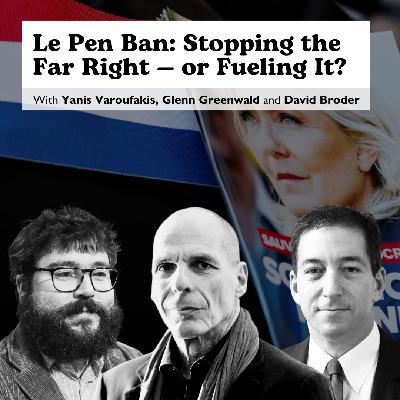
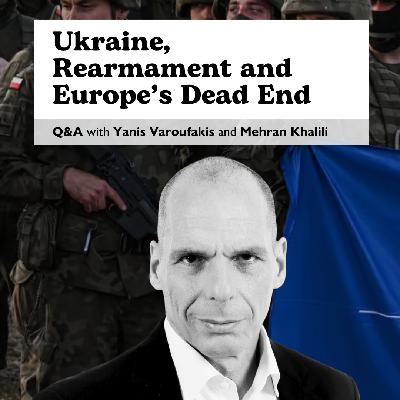
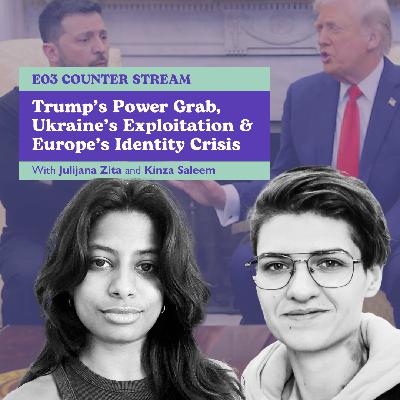
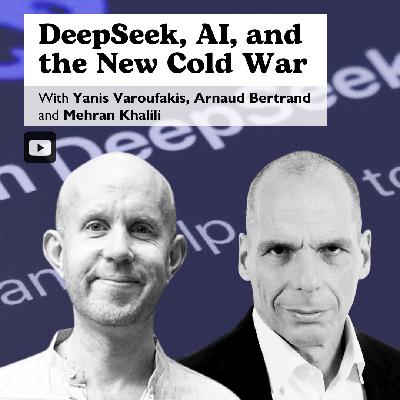














I don't know Yannis, love your sharp analyses.. but you seem to illustrate more and more the political concept of the horseshoe.. if you go so far left you eventually end up very close to the far right. You reserve zero criticism for Putin and Russian politics. Even if these provocations are true, does Russia really have to wage this war? Come on. Is he not a dictator? Don't they have even (far) less democracy then we do? I agree, there is much to criticize the EU for, ...but this is ALL you do!